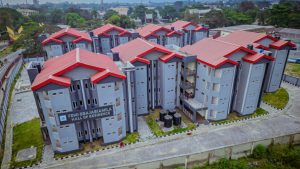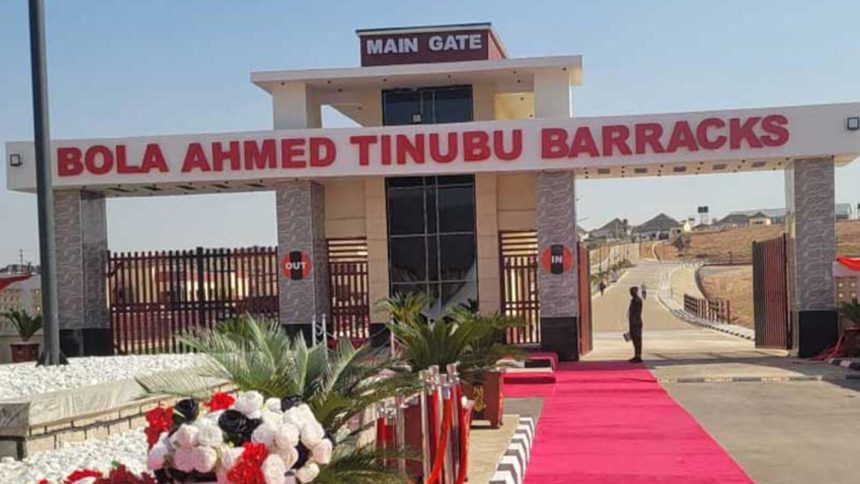In a country where roads collapse before ribbon-cutting ceremonies are over and hospitals run without bandages, one thing seems to work perfectly: politicians naming state-funded projects after themselves.
It’s the new badge of honor in Nigeria’s political game. Not good governance. Not policy reform. But plastering their names on buildings paid for by the public.
This disturbing trend is now woven into the fabric of Nigeria’s political landscape. The funds may be public, but the glory is often hijacked. Whether it’s a block of classrooms, a bridge, or a market—once it’s complete, it becomes a monument not to service or community, but to the politician who made it happen… with your money.
Politicians and Self-Promotion: The Rise of “Monumental” Naming
Former Speaker of the House, Femi Gbajabiamila, did it. The hall of residence at the University of Lagos wasn’t paid for from his personal account—it came from a constituency project funded through the national budget. Yet, there it stands, with his name proudly etched on it. Like a gift from a generous king.
Vice President Yemi Osinbajo had his turn too. A learning center for orphans of Boko Haram in Maiduguri, named after him. Noble project, questionable naming choice. Why stamp your name on something meant to serve the most vulnerable? Isn’t it enough to have done the work?
In Ebonyi, David Umahi named both a university and a market after himself while still serving as governor. In Akwa Ibom, a 21-storey tower was named after former governor Udom Emmanuel by the very man he helped put in power. It’s a mutual admiration society funded by the masses.
President Bola Ahmed Tinubu’s name is already on multiple public projects, just over a year into his term. Even his wife, Remi Tinubu, has been honored with her name slapped on a new healthcare center in Lagos—courtesy of a local council chairman desperate to curry favor.
It’s a growing list, and the absurdity doesn’t end there. Some of the same politicians who once criticized military regimes for naming infrastructure after themselves are now doing exactly that. Power, as they say, changes people. And in Nigeria, it appears to change plaques, too.

The Changing Culture: From Honoring the Dead to Self-Glorification
Historically, naming a project after someone was a sacred gesture. Reserved for giants like Obafemi Awolowo or Nnamdi Azikiwe, whose lives and legacies transformed entire regions. It wasn’t done lightly, and it certainly wasn’t done while they were still in office. It was a way for a grateful nation to say, “Thank you,” long after the applause had faded.
Today, the applause doesn’t wait. Politicians clap for themselves. They commission projects and christen them all in one breath. It’s governance meets vanity project—a strategy to write themselves into the history books before history has had a chance to judge them.
The Downside: A Culture of Impunity
Gbenro Olajuyigbe, Executive Director of Emergency and Risk Alert, calls this behavior what it is: crude impunity. He argues that this kind of self-glorification isn’t just tasteless—it’s dangerous. It erodes the democratic principle of public ownership and feeds into a culture of entitlement among the political elite.
The power holders treat public assets like private trophies,” Olajuyigbe said. “They’re not serving; they’re showcasing. We’ve allowed this behavior to continue because we’re intimidated, and in some cases, sycophantic. We’ve traded accountability for applause.”
Politicians, Accountability, and Governance
Bukola Bassey, a public affairs analyst, agrees. She believes the trend shows just how far we’ve let our expectations drop. A hospital gets built not a world-class facility, just a basic one—and it’s seen as divine intervention. The politician who facilitated it is celebrated like a messiah, instead of simply being acknowledged as someone doing their job.
“Building a road or a school is not extraordinary,” Bassey said. “It’s literally what they were elected to do.”
The Risk of Setting a Dangerous Precedent
Auwal Musa Rafsanjani of CISLAC thinks the practice is setting a very dark precedent. If current politicians name projects after themselves while in power, what’s to stop the next crop from naming the whole country after their families?
He points to the recent renaming of an airport to Bola Ahmed Tinubu Airport as an example of how this culture is getting out of hand. There was backlash, but no lesson learned. More projects have followed, each carrying a familiar name.
“It sends the wrong message,” Rafsanjani warns. “If you want a building named after you, earn it. Let others decide if your legacy deserves that honor.”
The Danger of Self-Glorification in Politics
But why do these leaders crave their names in stone? Psychologist Mathew Adebola says it’s a mix of insecurity and image-building. For many, holding office isn’t enough. They want permanence. They want something to outlive their time in power, even if their leadership was mediocre.
“It’s not about public service. It’s about personal branding,” Adebola explains. “It’s legacy-building on a foundation of vanity.”
And it works—until it doesn’t. Because history, unlike concrete, is fluid. Today’s monument can become tomorrow’s mockery. Statues fall. Buildings are renamed. Streets are repainted. What remains is impact, and no plaque can manufacture that.

The Road to True Legacy: Governance Without Glory-Seeking
In the end, the real tragedy isn’t just the self-promotion. It’s the missed opportunity to truly serve. These leaders could let their actions speak louder than their names. They could invest in institutions that last longer than their terms. But instead, they choose shortcuts to immortality, forgetting that a name on a building is just a name—unless the building changes lives.
And if things keep going this way, we might wake up to news of “Shekau University” or “Bandit General Hospital” someday.
Absurd? Yes. But in a nation where politics is theater and public service is brand management, it’s not as far-fetched as it sounds.



